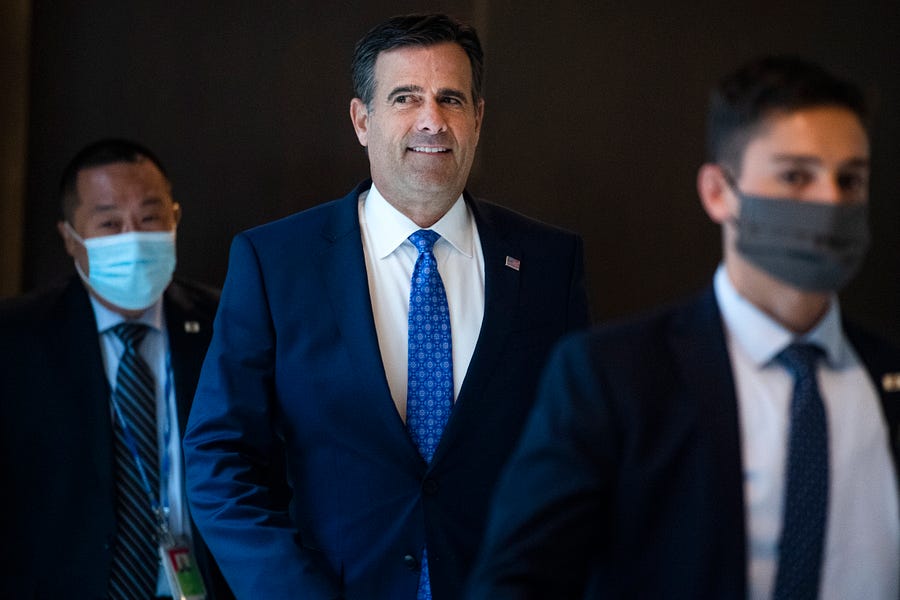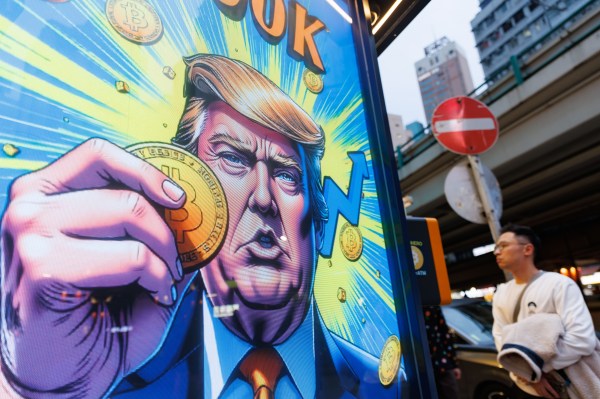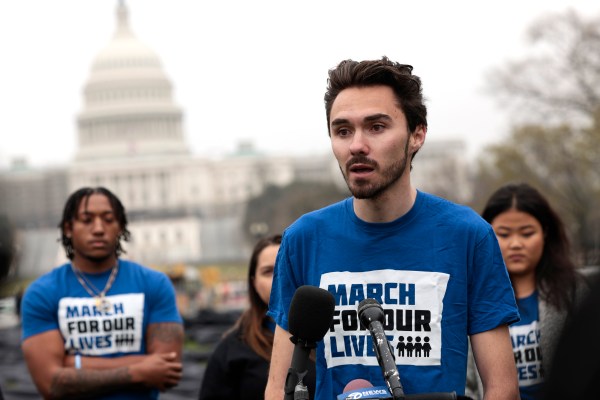Happy Monday! Only nine more “Happy Mondays!” until the election.
Quick Hits: Today’s Top Stories
-
The United States confirmed 46,429 new cases of COVID-19 yesterday, with 6.3 percent of the 741,205 tests reported coming back positive. An additional 510 deaths were attributed to the virus on Sunday, bringing the pandemic’s American death toll to 183,045.


-
The death toll from Hurricane Laura reached 16 over the weekend, and more than 350,000 Louisianans remained without power on Sunday, days after Laura reached the coast as a Category 4 storm.
-
Director of National Intelligence John Ratcliffe sent a letter to congressional leaders informing them his office will begin briefing Congress on election security issues in writing, rather than in-person.
-
After months of unrest in Portland, Oregon, a man was shot dead on Saturday during violent confrontations between Trump supporters and Black Lives Matter protesters.
-
Democratic presidential nominee Joe Biden announced plans to resume in-person campaigning—aimed at swing states—in the coming days, shifting gears from five months of primarily virtual appearances.
-
Chadwick Boseman—the American actor known for portraying the Black Panther, James Brown, Jackie Robinson, and Thurgood Marshall—died on Friday at age 43 after a years-long battle with colon cancer.
Congress Gets a New Pen Pal

We wrote a few weeks back about the U.S. intelligence community’s assessment of foreign threats to our electoral process. Russia is working to “denigrate former Vice President Biden” and “boost President Trump’s candidacy on social media and Russian television,” Director of the National Counterintelligence and Security Center William Evanina said in a statement, while China “prefers that President Trump … does not win reelection” and Iran is seeking to “undermine U.S. democratic institutions [and] President Trump.”
Evanina concluded by saying the intelligence community “recognizes there will continue to be demand for more information,” and that the IC “will continue to provide classified election threat briefings to the presidential campaigns, political committees and all Members of Congress.”
This weekend, Evanina’s superior—the recently confirmed Director of National Intelligence John Ratcliffe—let Congress know those briefings will look a little different for the final 66-day stretch before the election. The Office of the Director of National Intelligence (ODNI) will “primarily meet its obligation to keep Congress fully and currently informed leading into the Presidential election through written finished intelligence products,” Ratcliffe wrote in a letter to congressional leaders first obtained by CNN.
The sudden shift from in-person briefings, he said, is to prevent potential misunderstanding or politicization of election security materials. “It will also better protect our sources and methods and most sensitive intelligence from additional unauthorized disclosures or misuse,” Ratcliffe wrote.
Democrats—and some Republicans—were none too pleased. “Director Ratcliffe’s outrageous decision to stop providing briefings to Congress is an unprecedented attempt to politicize an issue—protecting our democracy from foreign intervention—that should be non-partisan,” Mark Warner, the ranking member on the Senate Intelligence Committee, wrote. Speaker Nancy Pelosi and House Intelligence Committee Chairman Adam Schiff called ODNI’s move a “shocking abdication of its lawful responsibility to keep the Congress currently informed,” adding that “the American people have both the right and the need to know that another nation, Russia, is trying to help decide who their president should be.” Sen. Susan Collins called the change “unacceptable,” arguing Ratcliffe “must remain a committed partner to safeguard our elections.”
Acting Senate Intelligence Committee Chairman Marco Rubio seemed to sympathize with Ratcliffe’s concern over leaks. “Career officials from various intelligence agencies briefed virtually every member of the House and then the Senate in a series of small group briefings,” he said in a statement. “Yet, before the second day of House briefings had begun, the classified information they had shared was already in the media.”
Rubio was presumably referencing stories like this one in Politico from the end of July. “Speaker Nancy Pelosi and other top House Democrats admonished the country’s top counterintelligence official during a classified election security briefing,” Natasha Bertrand and Kyle Cheney reported, “accusing him of keeping Americans in the dark about the details of Russia’s continued interference in the 2020 campaign.”
But Rubio committed to continue his committee’s “vigorous” oversight of the intelligence community. “Divulging access to classified information in order to employ it as a political weapon is not only an abuse, it is a serious federal crime with potentially severe consequences on our national security,” Rubio wrote. “Yet, this grotesque criminal misconduct does not release the intelligence community from fulfilling its legal requirements to respond to Congressional oversight committees and to keep members of Congress fully informed of relevant information on a timely basis.”
Ratcliffe defended his decision on Fox News yesterday. “I reiterated to Congress, ‘Look, I’m going to keep you fully and currently informed as required by the law,’” he told Maria Bartiromo. “But I also said, ‘We’re not going to do a repeat of what happened a month ago, when I did more than what was required at the request of Congress to brief not just the Oversight Committees but every member of Congress.’”
Ratcliffe accused members of Congress of leaking “to create a narrative that simply isn’t true, that somehow Russia is a greater national security threat than China.”
“I don’t mean to minimize Russia,” he continued. “They are a serious national security threat. But day in, day out, the threats that we face from China are significantly greater.”
Joe Biden released a statement on Saturday charging Ratcliffe with “shameless partisan manipulation to protect the personal interests of President Trump” and alleging that Trump is “hoping Vladimir Putin will once more boost his candidacy and cover his horrific failures to lead our country through the multiple crises we are facing.”
It’s unclear how the ODNI determined written briefings will be any less likely to leak than in-person briefings, but the switch will limit Congress’ ability to ask questions about the IC’s assessments and conclusions.
Clash Between Trump Supporters and Protesters Turns Deadly
The chaos continues. The violence and disorder that plagued several U.S. cities last week reared its head again Saturday, as a member of the right-wing group Patriot Prayer was shot and killed during a clash between rival groups of demonstrators in Portland, Oregon.
In many U.S. cities, protests broke out spontaneously in huge numbers after the death of George Floyd three months ago, then gradually cooled off. Portland, however, has been buffeted by unrest continuously since that time, with Black Lives Matter protesters and so-called Antifa provocateurs marching in the streets most days and then skirmishing with local and federal law enforcement most nights.
Saturday brought with it a new opportunity for explosive conflict: In addition to the BLM-affiliated protests already in the city, Trump supporters scheduled a caravan rally, with hundreds of vehicles driving through the Portland streets. Recordings on the ground showed a number of flare-ups between the groups, which police tried unsuccessfully to keep separate. Members of the caravan at points were filmed shooting paintballs and, reportedly, pepper spray into demonstrators on the sidewalk.
The circumstances that led to the killing remain unclear—despite the fact that, like so many other acts of violence over the past few months, it was seemingly caught on video. Patriot Prayer announced that the victim had been one of its supporters, but little else is known of him or his actions at the protests. No suspect has been identified or arrested.
Coming on the heels of last week’s violence in Kenosha, Wisconsin, we’ve now seemingly entered a grim new stage in this summer of unrest: Not just flare-ups of violence between loosely organized Black Lives Matter protesters and their affiliates and police, but instances of violence between groups belonging to opposing ideological factions.
President Trump responded to the news with a barrage of recriminations: Excusing videos showing aggression from his supporters as a “big backlash” that “cannot be unexpected” after the past several months of unrest, (falsely) accusing Joe Biden of not condemning anarchist violence, and criticizing the mayor of Portland for failing to contain it and turning down help from the federal government.
Biden, who last week issued a video condemning the violence and anarchy that has accompanied many Black Lives Matter protests this summer, released a biting statement Sunday evening: “It does not matter if you find the political views of your opponents abhorrent, any loss of life is a tragedy.”
“We must not become a country at war with ourselves,” Biden said. “A country that accepts the killing of fellow Americans who do not agree with you. A country that vows vengeance toward one another.”
But Biden also accused Trump of priming the pump for America’s seething unrest with his divisive, fever-dream brand of politics.
“The job of a president is to lower the temperature,” he said. “To bring people who disagree with one another together. To make life better for all Americans, not just those who agree with us, support us, or vote for us. Donald Trump has been president for almost four years. The temperature in the country is higher, tensions run stronger, divisions run deeper.”
NBA Boycott Prompts Chain Reaction Throughout Sports
The Orlando NBA bubble was thrown into disarray last week when, on Wednesday, the Milwaukee Bucks never came out of the locker room for the tip of Game 5 of their first-round series against Orlando—which they were leading 3-1—to protest the police shooting of Jacob Blake. The Bucks expected to forfeit the game, but—upon learning Milwaukee’s rationale—the Magic also left the court. The rest of Wednesday’s games were eventually postponed, and the move prompted a cascading series of moves by athletes and teams in other sports.
It’s not the first time the NBA has taken an activist approach to social issues in recent months. Following a long layoff due to coronavirus concerns, when the NBA resumed play in the bubble following the George Floyd protests some players took the court with social justice slogans on their jerseys, which they had negotiated the right to wear. The courts are adorned with a large Black Live Matters logo, and questions about the protests and other incidents of violence are intermingled with game-related questions in postgame press conferences.
So, it wasn’t necessarily surprising when the players responded as they did to the Blake shooting.
“Over the last few days in our home state of Wisconsin, we’ve seen the horrendous video of Jacob Blake being shot in the back seven times by a police officer in Kenosha, and the additional shooting of protestors,” Bucks’ players George Hill and Sterling Brown said. “Despite the overwhelming plea for change, there has been no action, so our focus today cannot be on basketball.”
ESPN and others reported Wednesday night that the entire playoffs were in jeopardy, with superstars LeBron James and Kawhi Leonard reportedly in favor of shutting it down.
But cooler heads prevailed. The Athletic reported James and Chris Paul met with former President Barack Obama, who reminded them that they had more of a platform to address their concerns if they continued playing.
NBA players voted on Thursday morning to resume the playoffs, and on Friday, the league’s owners and players’ association released a joint statement announcing a Saturday restart, the establishment of a social justice coalition for civic engagement and police reform, and the conversion of NBA arenas across the country into safe, in-person voting locations for November’s general election. “In life, you find things that hold value to you, and things to fight for,” Denver Nuggets guard Jamal Murray said in a post-game interview, when asked about the past week. “We found something worth fighting for.”
The NBA players found allies across the athletic world. Several black baseball players recused themselves from starting lineups, while a handful of MLB games were postponed entirely. The NHL called off Thursday and Friday’s playoff games; MLS and the WNBA took a similar path. Most team owners and executives voiced support for their players’ decisions.
In tennis, Naomi Osaka prompted a short delay in the Western and Southern Open. Osaka, the world’s highest paid female athlete, said she would withdraw from the tournament.
“As a black woman I feel as though there are much more important matters at hand that need immediate attention, rather than watching me play tennis,” she said in a tweeted statement. I don’t expect anything drastic to happen with me not playing, but if I can get a conversation started in a majority white sport I consider that a step in the right direction.”
Osaka eventually agreed to resume playing. She won her semifinal match but withdrew from the final with a hamstring injury.
Worth Your Time
-
BuzzFeed News compiled thousands of satellite images and dozens of interviews to dive into the detention of more than 1 million Muslims in China since 2016. Internment camps for Uighurs, Kazahks, and other Muslim minorities once occupied repurposed public buildings, like schools and retirement homes. But the Chinese government’s effort to build a sprawling infrastructure, from scratch, reveals the magnitude of its commitment to the repressive “re-education” of religious and ethnic groups. “The construction of these purpose-built, high-security camps — some capable of housing tens of thousands of people — signals a radical shift away from the country’s previous makeshift use of public buildings, like schools and retirement homes, to a vast and permanent infrastructure for mass detention,” the authors write.
-
The internet exploded this weekend with heartfelt remembrances of Chadwick Boseman. Few were aware of Boseman’s cancer; he apparently shot his films from 2016 onward in between chemotherapy sessions. “He was living with his illness the entire time I knew him,” said Ryan Coogler, who directed Boseman in Black Panther. “Because he was a caretaker, a leader, and a man of faith, dignity and pride, he shielded his collaborators from his suffering.” Wesley Morris wrote about how only Boseman could so masterfully bring larger-than-life figures like Jackie Robinson, Thurgood Marshall, and James Brown to the big screen. Watch this Jimmy Fallon clip to fully grasp how important Boseman’s role as King T’Challa was to so many, or the 2018 commencement address he delivered at Howard University to see how his work inspired the next generation.
Presented Without Comment
Also Presented Without Comment
Toeing the Company Line
-
Tune into the latest Dispatch Podcast for a lively discussion between Sarah, Steve, and Republican pollster Kristen Soltis Anderson about the recent conventions and the state of the presidential race heading into the final two months. “I don’t know that anything unexpected or dramatic came out of the last two weeks, and I doubt that to the extent there are persuadable voters, a lot of them are spending eight hours of their life in front of the tv each week watching this,” mused Anderson.
-
We believe Jonah is officially back in the Swamp after a few weeks away, but even if he isn’t, he recorded a new Ruminant podcast for us over the weekend. Tune in for a conversation (with himself) about the end of the Republican National Convention, the activist left, and political grandstanding more broadly.
-
In case you missed it: Sarah was a panelist on ABC News’ Sunday show, This Week, yesterday. She expanded on some of the themes she’s touched on in recent Sweep newsletters. Speaking of The Sweep, today she writes the speech she says that President Trump should have delivered last week.
Let Us Know
Do you think the NBA player strikes were effective? If not, what do you think is the best way for players to make their voices heard?
Reporting by Declan Garvey (@declanpgarvey), Andrew Egger (@EggerDC), Charlotte Lawson (@charlotteUVA), Audrey Fahlberg (@FahlOutBerg), James P. Sutton (@jamespsuttonsf), and Steve Hayes (@stephenfhayes).
Photograph by Tom Williams/CQ-Roll Call/Getty Images.







Please note that we at The Dispatch hold ourselves, our work, and our commenters to a higher standard than other places on the internet. We welcome comments that foster genuine debate or discussion—including comments critical of us or our work—but responses that include ad hominem attacks on fellow Dispatch members or are intended to stoke fear and anger may be moderated.
With your membership, you only have the ability to comment on The Morning Dispatch articles. Consider upgrading to join the conversation everywhere.